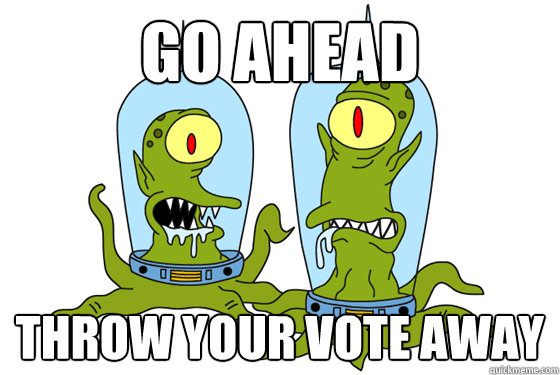Recently,
I was handed a political question I couldn't answer. My friend from St.
Louis wanted to know what the difference was between a Presidential
Preference Primary (the Missouri one is held in early March) and a
Primary (another Missouri primary is held in August). The website was
unhelpful, and it wasn't clear when my friend should send in her
absentee ballot.
And that's not the only
primary question I've been stumped by. What is the difference between a
primary and a caucus? When are the primaries? Which primaries, can you
vote it? I did some research, so you don't have to, and I'm going to
break it down for you, Buzzfeed-listicle style (no copyright
infringement intended)!
What is a primary?
A
primary is an nominating contest between members of the same party, to
decide who will represent the party in a general election. So in a
primary, Democrats are running against Democrats, Republicans are
running against Republicans, and Gary Johnson is running against time.
Primaries
are very important leading up to the presidential election, and
important at the state level as well. In a very liberal or conservative
city or state, the primary determines who is going to win the general
election. For example, a Republican would never win an election in the
Village in New York City, so whichever Democrat wins the primary there
is the person who will be elected.
What is a caucus?
 |
| "Caucus, caucus, caucus!" |
Good
question! I work in government, and recently had a discussion with my
co-workers where we realized none of us actually knew what a caucus was.
A caucus is the same premise as a primary, but instead of people
showing up to a high school gym and casting a secret ballot, registered
voters from each party show up to a high school gym and discuss the candidates up for election and the issues. Each precinct chooses
delegates, or representatives, who will represent the precinct at the county level
To further complicate the process, in
Iowa, the precinct delegates discuss again at the county level. Each
county then chooses delegates to represent the county, and the county's choice for nominee at the state level. Finally, in June, all the
state level delegates get together, and the world finally figures out who won the Iowa vote for the primary
So even though
the Iowa caucus is the first event of the presidential election, the
real winner isn't declared until June, making New Hampshire, with its
February 9th statewide primary, the real first election.
How do I vote in the primary?
 |
| "No, I want to vote for Obama! It's time for a change!" |
The
best way to find information about how and when to register to vote, or
apply for an absentee ballot, is to go to your state's Department of
State website. Unlike the Federal Secretary of State (shout out to my
boy J. Kerry), state Secretary's of State mostly handle voting. If that
doesn't work, try finding the Board of Elections in your state for more
information.
When are the primaries?
Glad you asked!
Which primaries can I vote in?
Depends
on which party you're registered as, and where you live. There are
three different types of primaries, open, closed, and semi-closed.
In
an open primary, anyone, regardless of party affiliation, can vote in
whichever primary they want. That means, Democrats can vote in
Republican primaries, independents can vote in Democratic primaries,
etc. Of course, no one can vote in more than one primary. One person, one vote after all.
In a semi-closed primary, those registered to vote in one party can only vote in their party's primary, but independent voters can vote in whichever primary they want
In
a closed primary, registered voters can only vote in the party they are
registered in, and independents can't vote in primaries at all. So
if you want to vote in the primary, before you register to vote, you
should figure out what type of primary your state holds. For example, it
doesn't make sense to register as an independent in New York, because
New York has a closed primary, so registering yourself as an independent
prevents you from participating in any primary
 |
| Kang and Kodos, reminding you to be smart about your vote this year. |
Check out a
detailed map here to see if you need to change your voter registration.
What is the difference between a presidential preference primary, and a primary?
 |
| Homer, running at the state level. |
Finally,
back to the question that sparked it all. To get the answer to this, I
had to email the Missouri Secretary of State's office, a last resort I
recommend all of you take advantage of. Within 24 hours, Mark had
emailed me back, explaining that:
"The presidential preference primary will be held March 15, 2016 and the August primary will be held on August 2, 2016.
The presidential preference primary is
held to choose party nominees for U.S. president, and the August
primary is held to elect all other party nominees (state and county
offices, for example).
As these are two separate elections, you would need to request two separate absentee ballots.
"
Shout out to Mark for that solid bit of info,
and his dedication to his job. Thank your government workers everyone.
We're people too.
This blog post is already pretty
long, but I wanted to include a plea at the end to vote in your state,
as well as presidential primaries. If they are held on two different
days, please make sure to vote in both! A lot of important policy is
made at the state level, and oftentimes, that is when young people are
least represented, simply because there isn't enough news coverage about
state and local elections. But sometimes, it's those elections that are
the most influential, and since they're on a smaller scale, the
elections where your vote counts more.
This
Presidential Election Season, give yourself the privilege of knowing who
your state representatives are, now that you know everything about how
to vote in a primary!






